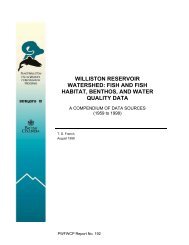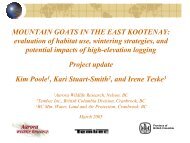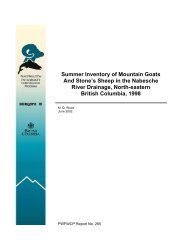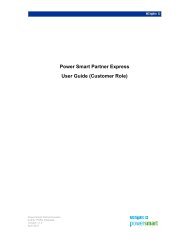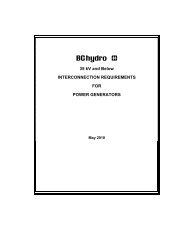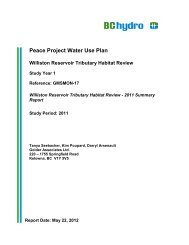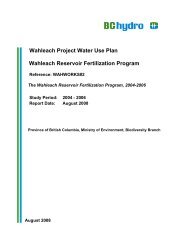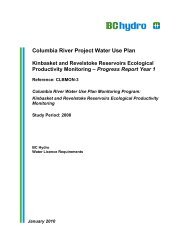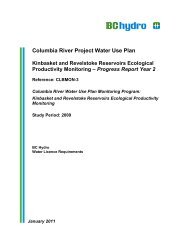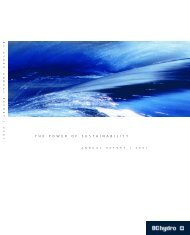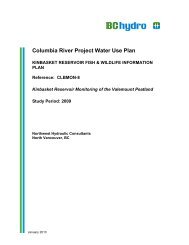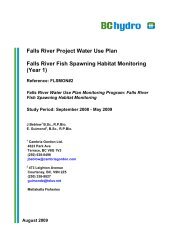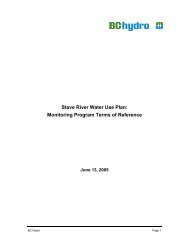2001 Triple Bottom Line Report - BC Hydro
2001 Triple Bottom Line Report - BC Hydro
2001 Triple Bottom Line Report - BC Hydro
You also want an ePaper? Increase the reach of your titles
YUMPU automatically turns print PDFs into web optimized ePapers that Google loves.
E C O - E F F I C I E N C Y<br />
Eco-efficiency means being able to meet the energy needs of our customers in a manner that reduces the intensity of our impacts on<br />
the environment to a level in line with the earth’s estimated carrying capacity. We are moving towards eco-efficiency by incorporating<br />
its principles into our decision-making and by improving bird, fish and animal habitat in areas affected by our operations.<br />
B I O D I V E R S I T Y<br />
Throughout British Columbia we have operations in a full range<br />
of ecosystems and in close proximity to diverse fish and wildlife<br />
populations. Being eco-efficient includes ensuring we address<br />
BIRD PROTECTION<br />
We are making progress in protecting birds from accidental contact<br />
with powerlines. The reported number of mishaps involving<br />
eagles is down, the number of trumpeter swan mortalities has<br />
declined 90 per cent in areas where lines have been marked,<br />
and bird-caused power outages have been reduced following<br />
the installation of bird guards on transformers in selected areas.<br />
Also, on Vancouver Island, we began a project to improve<br />
protection of bald eagle nest trees. We completed a nest tree<br />
FISH AND AQUATIC ECOSYSTEMS<br />
Concern for fish habitat and populations is incorporated into the<br />
management of our day-to-day activities. We also help promote<br />
species recovery and health through research and rehabilitation<br />
projects sponsored by the perpetual restoration and compensation<br />
programs developed to manage impacts resulting from construction<br />
of our facilities.<br />
<strong>BC</strong> <strong>Hydro</strong> has also contributed $2 million to Fisheries Renewal<br />
B.C. in a partnership agreement that saw <strong>BC</strong> <strong>Hydro</strong> play a<br />
major role in the agency’s work to enhance and restore B.C.’s<br />
and minimize, as a result of day-to-day activities, any strains<br />
placed on habitats, and support the continued health and<br />
abundance of all species.<br />
E N V I R O N M E N T A L B O T T O M L I N E | 4 2<br />
GREEN ENERGY<br />
MANAGING IMPACTS<br />
ECO-EFFICIENCY<br />
inventory in the southern Vancouver Island area, and convened<br />
workshops to exchange information with conservation groups<br />
working to protect the species and its habitat. We mapped<br />
habitat, shared observations about eagle requirements for<br />
nesting and perching, and discussed ways to create a safer<br />
environment for the birds. Results of the dialogue and work<br />
include plans to modify some of our structures to reduce the<br />
risk of eagle electrocutions.<br />
fish stocks. Projects concentrated on fish habitat, water quality,<br />
fish passage and strategic planning in watersheds affected by<br />
our operations. Funding was divided between habitat restoration<br />
and protection work identified by our regional fisheries<br />
biologists and environmental staff, and community-generated<br />
projects. All the projects were delivered by partnership groups<br />
and community coalitions throughout B.C. and included<br />
commercial and recreational fishing groups, environmental<br />
groups and other local organizations.



